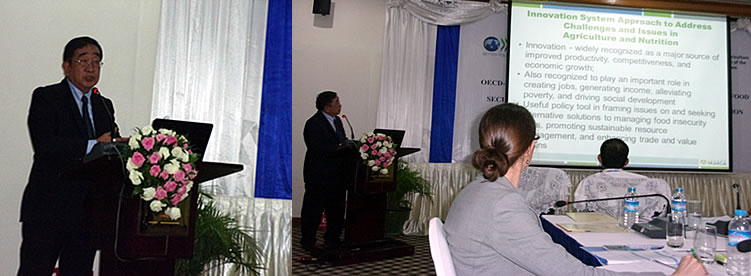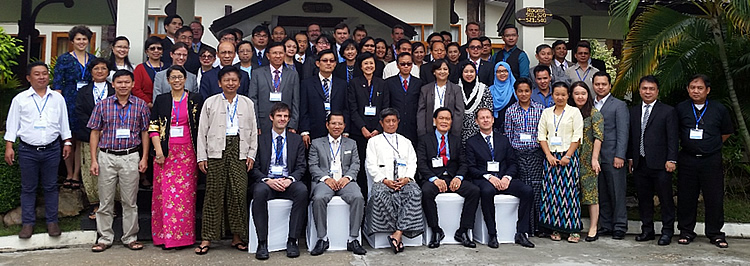The assessment was done using OECD’s four-dimension framework - governance of agricultural innovation systems, public and private investments in agricultural innovations, facilitation of knowledge diffusion through education and agricultural extension services, and cross-country supply of agricultural innovations. In his presentation, Mr. Bernie Justimbaste, SEARCA’s Principal Investigator for the study, discussed the role of agricultural innovation system (AIS) in finding new ways to address key challenges and opportunities brought about by the changing agricultural landscape in the region. He highlighted the observation that AIS is a relatively new and emerging concept for many ASEAN Member States (AMS) and that its adoption will require a “whole-of-government approach” and strategic alliances with the private sector.
 He shared some of the major findings of the study, namely: (1) There is typical fragmentation in institutional arrangements for innovations in most AMS, which limits significantly the connection between research and demand; (2) A number of AMS have valuable experiences that have seriously tackled this fragmentation challenge; (3) The government has been and continues to be the predominant funder of agricultural R&D, but some governments are beginning to seriously consider more innovative funding mechanisms; (4) There is a need to transform public and private extension and advisory services and agricultural education and training to more demand-driven system; and (5) There are a number of existing networks, consortia and platforms in the ASEAN that can be possibly tapped for cross-border technology transfer and for promoting participation of AMS in addressing transnational innovation issues.
He shared some of the major findings of the study, namely: (1) There is typical fragmentation in institutional arrangements for innovations in most AMS, which limits significantly the connection between research and demand; (2) A number of AMS have valuable experiences that have seriously tackled this fragmentation challenge; (3) The government has been and continues to be the predominant funder of agricultural R&D, but some governments are beginning to seriously consider more innovative funding mechanisms; (4) There is a need to transform public and private extension and advisory services and agricultural education and training to more demand-driven system; and (5) There are a number of existing networks, consortia and platforms in the ASEAN that can be possibly tapped for cross-border technology transfer and for promoting participation of AMS in addressing transnational innovation issues.
The OECD-FAO-ASEAN Conference was attended by around 70 high-level officials from relevant ASEAN Senior Officials Meeting (SOM) for Agriculture and Forestry, Health Development, Rural Development and Poverty Eradication, and Social Welfare and Development, as well as representatives from international development organizations, ASEAN civil society organizations, the academe, and the private sector. It provided a venue for sharing views and research outputs with the aim of improving the evidence-base available to AMS policy makers. The conference also discussed making agriculture and food systems policies nutrition-sensitive and recognized that this requires multi-sectoral approach beginning with food and agriculture, but with complementary interventions in public health, rural development, education, and social protection.
The Conference was able to assert the importance of evidence-based policy-making and provided the AMS participants with a suite of research outputs and evidences, including the SEARCA study on AIS, which they can use to develop policies that will enable food security, agricultural productivity and improved nutrition in their respective countries. (Bessie M. Burgos)
